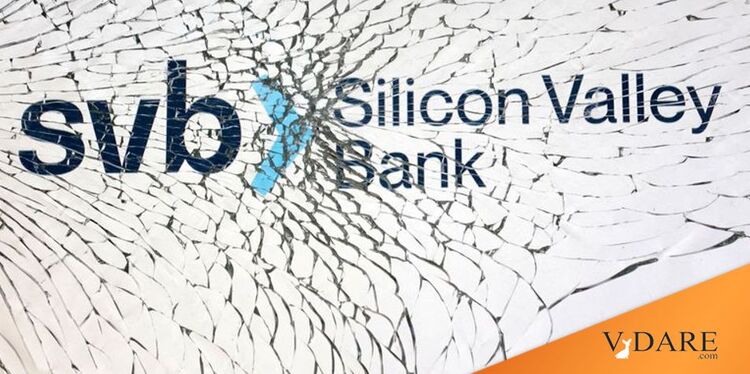
So, Will Silicon Valley Bank Be Another End Of The World?
By Steve Sailer
03/12/2023
I can recall going on a camping trip in the summer of 2007, and when I got back online, the world had clearly shifted as some Southern California mortgage lenders had gone belly up. It took another 14 months or so for the implications to play out…
Now, one of the 20 biggest banks in the U.S., Silicon Valley Bank, is broke. Silicon Valley Bank is exactly what its name claims: a bank that is massively plugged into the long overheated tech start-up scene:
"You got it all wrong, Joe. You’re money isn’t here right now. It’s in Franks bullshit startup, and 100 other completely worthless ideas." pic.twitter.com/6J5XIEIVIB
— Eddy Elfenbein (@EddyElfenbein) March 10, 2023
John Kenneth Galbraith wrote in The Great Crash 1929: “One of the uses of depression is the exposure of what auditors fail to find.” That’s often made even pithier, such as, “Recessions uncover what auditors miss.”
My impression has been that start-ups had gotten vastly easier than they used to be. In the 20th century, I worked for one successful tech start-up and one tech start-up that failed, but even the first was long a very near-run thing, with failure being a recurrent worry for decades. In recent years, tech start-ups seem lower risk than in the old days… until, presumably, they stop being lower risk.
But it seems like the problem with SVB is less that SVB put its money into start-ups than that start-ups put their money into SVB, and its collapse will make it harder for start-ups to function on Monday morning. E.g., Vox Media corporate credit cards issued through SVB have stopped working. Am I getting that right?
Or is it a push-me-pull-you relationship with SVB lending money to start-ups in return for them depositing their money with SVB?
Are investors rushing to provide working capital to start-ups, or is everybody taking SVB’s demise as a Portent?
Supposedly, 97% of the deposits in Silicon Valley Bank are uninsured because the accounts exceed the FDIC’s $250k maximum, which is testimony to just how much the rich-got-richer during the COVID stimulus.
A couple of unanswered questions revolve around how unusual SVB is. Is the popping of the tech bubble going to eviscerate many other banks too, or is the problem concentrated geographically and by sector?
And was SVB unusually incompetent at managing its risks?

I’m assuming that Ms. Diversity Pokemon Points is head of Financial Risk Management & Model Risk in the London office of Silicon Valley Bank rather than at the home office. But still…
According to Michael Cembalest of JP Morgan, Silicon Valley Bank ran a highly risky strategy:
While capital, wholesale funding and loan to deposit ratios improved for many US banks since 2008, there are exceptions. As shown in the first chart, SIVB was in a league of its own: a high level of loans plus securities as a percentage of deposits, and very low reliance on stickier retail deposits as a share of total deposits. Bottom line: SIVB carved out a distinct and riskier niche than other banks, setting itself up for large potential capital shortfalls in case of rising interest rates, deposit outflows and forced asset sales. …
It’s fair to ask about the underwriting discipline of VC firms that put most of their liquidity in a single bank with this kind of risk profile.
It would be nice if the Fed’s war on inflation were to surgically puncture over-inflated sectors like crypto and tech start-ups without, say, laying off most of the recreational-vehicle-assembly line workers in Indiana as collateral damage, in contrast to 2008, when dumb mortgage lending in California, Arizona, Nevada, and Florida ultimately hammered South Bend’s RV industry.
Whether that’s possible, I dunno.
So, SVB’s depositors are howling to be made whole by the taxpayers on the grounds that, while they deserve all the money on the way up, on the way down they need to be protected to save the RV workers’ job. Think of the poor RV workers!
As always, don’t come to me for financial advice. My system for not being at much risk from bank failure is to not have much money in the bank.
What do you think will happen?

